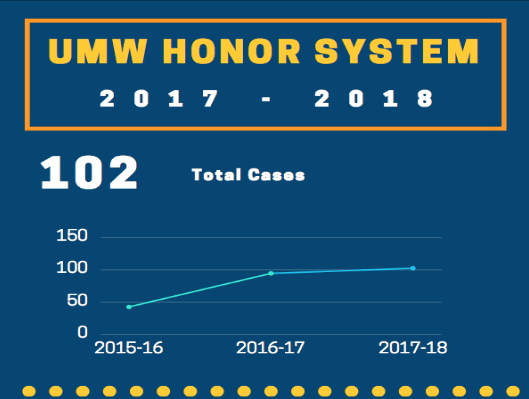UMW Honor Council sees uptick in reported violations
3 min read
Dr. David Rettinger
By SAMANTHA BENNETT
Staff Writer
Honor Code violations have been on the rise in recent years, according to new data from the Honor Council.
During the 2017-2018 academic year, the Honor Council heard 102 cases – more than double the number heard the year before.
The increase coincides with several changes that were made to the Honor Constitution which were implemented recently. Changes included expedited sanctioning, which began two years ago and refers to the practice of accused students admitting guilt right away. Under this process, the traditional hearing is replaced with a meeting between the student and accuser. An honor council member is also present at the meeting to ensure a fair resolution.
“There is an increased number of cases, but that shows a sign of a healthy system,” said Dr. David Rettinger, director of Academic Integrity Programs and psychology professor at UMW. Rettinger took over advising the honor council six years ago.
Senior psychology major Sarah Balenger is president of the Honor Council and has been a member since her freshman year.
“There has been an increase in cases coming before the Honor Council since my freshman year,” said Balenger.
Vice president of the Honor Council, junior art history major Taylor Stine, said her job has been directly affected by the increased number of cases. Stine is in charge of scheduling the Honor hearings that must occur for each case. Each hearing requires the presence of five student panel members, at least two student advisors, at least two faculty advisors, at least one procedural advisor, and either the president or vice president of of Honor Council. As part of her job, Stine must coordinate everyone’s schedules to come up with a day that all these people can meet and hold a hearing.

“The beginning of fall semester can be particularly hard for scheduling,” said Stine. The difficulty stems in part from the incoming freshman class not voting on its representatives until three to four weeks into the semester, before which the Honor Council is short five members.
Business professor and procedural advisor for the Honor Council Dr. John Marsh attributes part of the reason behind the increase in reported cases to the faculty who have reported issues.
“The number of faculty that actually report Honor Violations has gone up,” said Marsh.
Marsh feels the recent amendments made to the Honor Constitution has given a lot of professors more confidence in the Honor Council.
“Cases used to take a long time and professors may not have wanted to wait months for a case to be heard and would try to unofficially resolve the issues themselves,” said Dr. Marsh. “Now, cases move much faster and I think professors are more likely to report a violation knowing the case will be heard and sanctioned much faster.”
According to Marsh, as a result of the expedited sanctioning, “cases get resolved faster and everyone appreciates that.”
Recently, students have started an uptick in instances of their peers reporting before Honor Council.
“I have noticed an increasing number of my friends are being taken to Honor Council,” said junior English major Mary Margaret Burns. “I do not know if they are becoming lazy and resort to cheating, or if they have been cheating the whole time but are just now getting caught.”
“I have not been to Honor Council, nor do I know any one that has been. But I am surprised that there has been such a major increase in violation reports,” said senior communication and digital studies major Bao Randrianarivelo.
With turnaround times being shorter, students and faculty are much more invested in and comfortable reporting violations, circumstances which translate to increased reporting of honor code violations, according to Rettinger. When schools re-energize their honor systems, cases tend to increase, he said.
According to Balenger, the Honor Council has been reaching out to students, making sure they understand that, they too, can report violations. The council is working to make the process of reporting simpler for faculty and more efficient for everyone. The members of the Honor Council do not think there are more violations, but simply there is more reporting by students and faculty.


